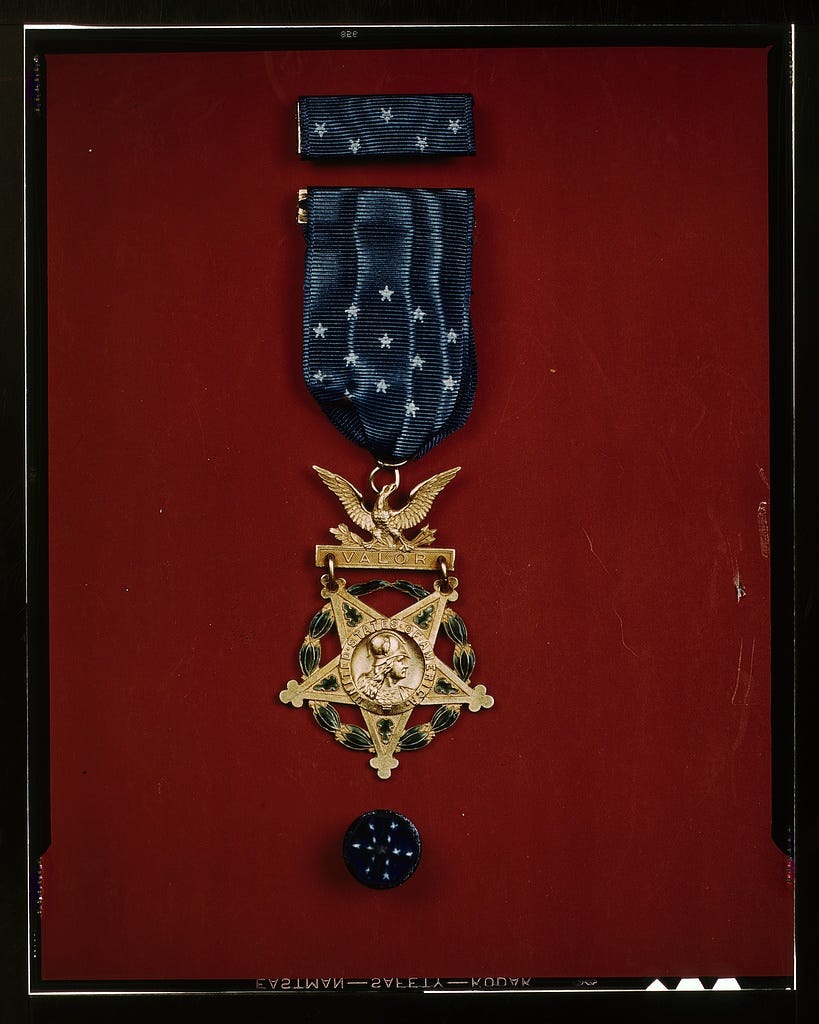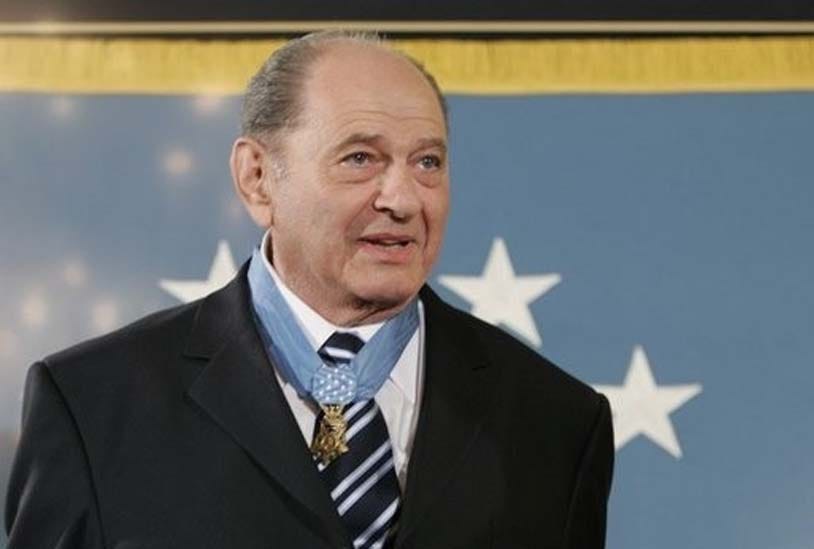37 Words
The righting of wrongs and what it tells us about America
Legislative text rarely gets the blood moving. Even when a bill talks about our highest values, the language of laws runs towards illegibility for anyone not fluent in parliamentarian vocabulary. Yet sometimes if we hack our way through the dense thicket of subsections and subparagraphs, we stumble upon the profound. Such is the case with the National Defense Authorization Act (NDAA) for Fiscal Year 2002, enacted into law in December 2001.
At 384 pages it is a tome. The table of contents alone runs for more than 15 pages. It is filled with bureaucratic minutiae. Most sentences read like this one: “AMENDMENTS.—(1) Section 217 of the National Defense Authorization Act for Fiscal Year 1998 (Public Law 105–85; 111 Stat. 1660), as amended by subsection (a)(1), is further amended—”. However, somewhere between the amendments of amendments are 37 words that while written in the sterile language of laws, speak to the deepest values of the nation.
“The Secretary of each military department shall review the service records of each Jewish American war veteran or Hispanic American war veteran described in subsection (b) to determine whether that veteran should be awarded the Medal of Honor.”
Medal of Honor from the 1940s. Source: Library of Congress
Put simply, the law directed the military to review the records of service members potentially denied the Medal of Honor due to the fact that they were Jewish or Hispanic. This was both an admonition and a challenge, a call for the nation to wrestle with the righting of wrongs and confront instances where individuals worthy of America’s highest military award for valor were rejected due to their race, ethnicity, or religion.
In both outcomes and process, these 37 words revealed much about who we are as Americans and our national story more generally. Consider, first, the outcome.
Tibor Rubin receiving the Medal of Honor in 2005. Source: Army.
Holocaust Survivor and Hero of the Korean War
As a result of this review, America went on to present dozens of individuals with the Medal of Honor.1 One of the recipients was Tibor Rubin.2 His story alone showcases American exceptionalism at its finest.
Corporal Tibor Rubin was born in 1929 in Hungary. As Jews, his family was targeted by the Nazis and suffered tremendously in the Holocaust: Rubin’s parents and sister Edith were murdered in concentration camps. Rubin, only 13 years old, was sent to Mauthausen concentration camp, where the Nazi commander said, “none of you will ever make it out of here alive.” Rubin managed to survive, however, and in 1945 was liberated by the American Army. As a result of his liberation, Rubin vowed to move to America and serve in the Army.
Soon after the war, Rubin fulfilled this vow. In 1948 he traveled to America and in 1949 he joined the Army.3 Still not yet an American citizen, Rubin deployed in 1950 to the Korean War as part of the 8th Cavalry Regiment, First Cavalry Division.4
In July 1950, near the Pusan Perimeter, Rubin single-handedly defended a critical hill for over 24 hours, holding off the North Korean forces long enough for his regiment to successfully withdrawal. Then in October, near Unsan, Rubin again stepped forward to cover his unit’s withdrawal. This time, however, he was captured by the Chinese military. Rubin spent more than two and half years as a prisoner of war (POW) in terrible incarceration camps. Yet even when confronted once again with a death-camp, Rubin demonstrated exceptional bravery: he taught his fellows POWs how to manage their brutal treatment, risked his life to steal food and bring medicine, and ultimately helped save dozens of his fellow prisoners.5 For his heroism as a POW and on the battlefield, Rubin was nominated for the Medal of Honor four times by his brothers in arms. Yet he did not receive the award.
This was due to intense antisemitism. Numerous affidavits from Rubin’s fellow soldiers underscore that their senior sergeant denied Rubin recognition because he was Jewish. Rubin later recalled that this sergeant referred to him as “son of a bitch Hungarian Jew.” The issue was compounded by the war deaths of Rubin’s commanders, the officers most likely to have kept his Medal of Honor case active.
Rubin left the POW camps as part of a prisoner exchange in 1953. He returned home, became an American citizen, and built a wonderful life. He continued to express a love for the Army and was active in veterans groups. But something did not sit right with his fellow veterans.
Best Country in the World
Veterans of Rubin’s unit began organizing to petition the military to take up Rubin’s case. They eventually became part of a broader effort, one that included a campaign by Mitchel Libman, a Korean War veteran, to advocate on behalf of Leonard Kravitz. Kravitz was a Jewish soldier who gave his life in the war and had been, in Libman’s view, unjustly denied the Medal of Honor.6 Working with veterans’ groups such as the Jewish War Veterans of America, this citizens-led campaign ultimately succeeded, with Congressman Robert Wexler of Florida introducing the legislation that turned into the Medal of Honor review in the 2002 NDAA.7
President George W. Bush awarded Tibor Rubin the Medal of Honor in 2005. Rubin referred to this as receiving, “the highest honor of the best country in the world." Rubin passed away in 2015, having done more than his fair share to make America the best country in the world.
America is not perfect. Rubin and many others should have received the Medal of Honor in the 1950s. They did not because we failed, on the individual and institutional levels, to live up to one of our most deeply-held values, the belief that “all men are created equal”. This was not the first nor would it be the last time we failed to recognize the heroism of men and women for reasons counter to our national ideals. That we later righted these wrongs does not mean we should forget the failures. But it does mean they are not the end or totality of the story.
In Rubin’s case, the story continued with American citizens doing what we have done since the earliest days of the republic when confronted with a failure of justice. They organized and found common cause with other Americans of different backgrounds and views. They petitioned the government and persevered in the face of setbacks. Finally, they brought political leaders of different parties together to enact a new law. As a result, we recognized true heroism and wrote into the American story new chapters, ones that more fully capture the contributions of all our fellow-citizens; or to borrow from Steven Smith, we enlarged our “conception of who belongs in the American family.”8
This process, as much as the outcomes produced by the 2002 NDAA, highlights something exceptional about Americans and the nation. Among our people there exists such deep commitment, however messily and imperfectly it is expressed in day-to-day life, to make the country an ever-better version of itself; to give even greater meaning to the transcendent ideals laid out in our founding documents and reinvigorated at multiple times in our history. And as a nation, America has a unique capacity to right its wrongs; to become, through the efforts of its citizens, ever more deserving of the love Tibor Rubin expressed when he received the Medal of Honor.
Army 250 is a passion project celebrating the Army’s place in American society. If you enjoyed this piece, please share it with your networks. If you are a new reader, please subscribe below.
Additional Resources:
The Association of the United States Army has a graphic novel on Corporal Rubin and his service. You can view it here.
Here is the Army’s official site for Corporal Rubin’s Medal of Honor.
Patty Nieberg at Task & Purpose did a thorough article on Corporal Rubin; you can view it here.
Daniel Cohen wrote a book, Single Handed, about Tibor Rubin, which you can see here.
The act was subsequently expanded to address instances where individuals who were neither Jewish nor Hispanic might have had bravery overlooked due to issues of prejudice.
Corporal Tibor Rubin’s story is truly incredible and deserving of much more coverage than I provide in this essay. I include links to a number of websites and documents that tell his experiences in much greater detail.
Rubin persisted through failure. With his first attempt to join the Army, he was rejected due to failing the required English exam.
The Chinese offered to send Rubin—still technically a Hungarian citizen—to communist Hungary. Rubin refused.
Pfc. Leonard Kravitz’s story is also incredible. You can read some of it here. His nephew, rock musician Lenny Kravitz, is named after him and spoke at the posthumous Medal of Honor ceremony in 2014.
Smith, Steven. Reclaiming Patriotism in an Age of Extremes. Yale University Press: 2021.





Powerful story demonstrating the pros of our beautiful republic. Appreciate you and the light you shine on these important stories.